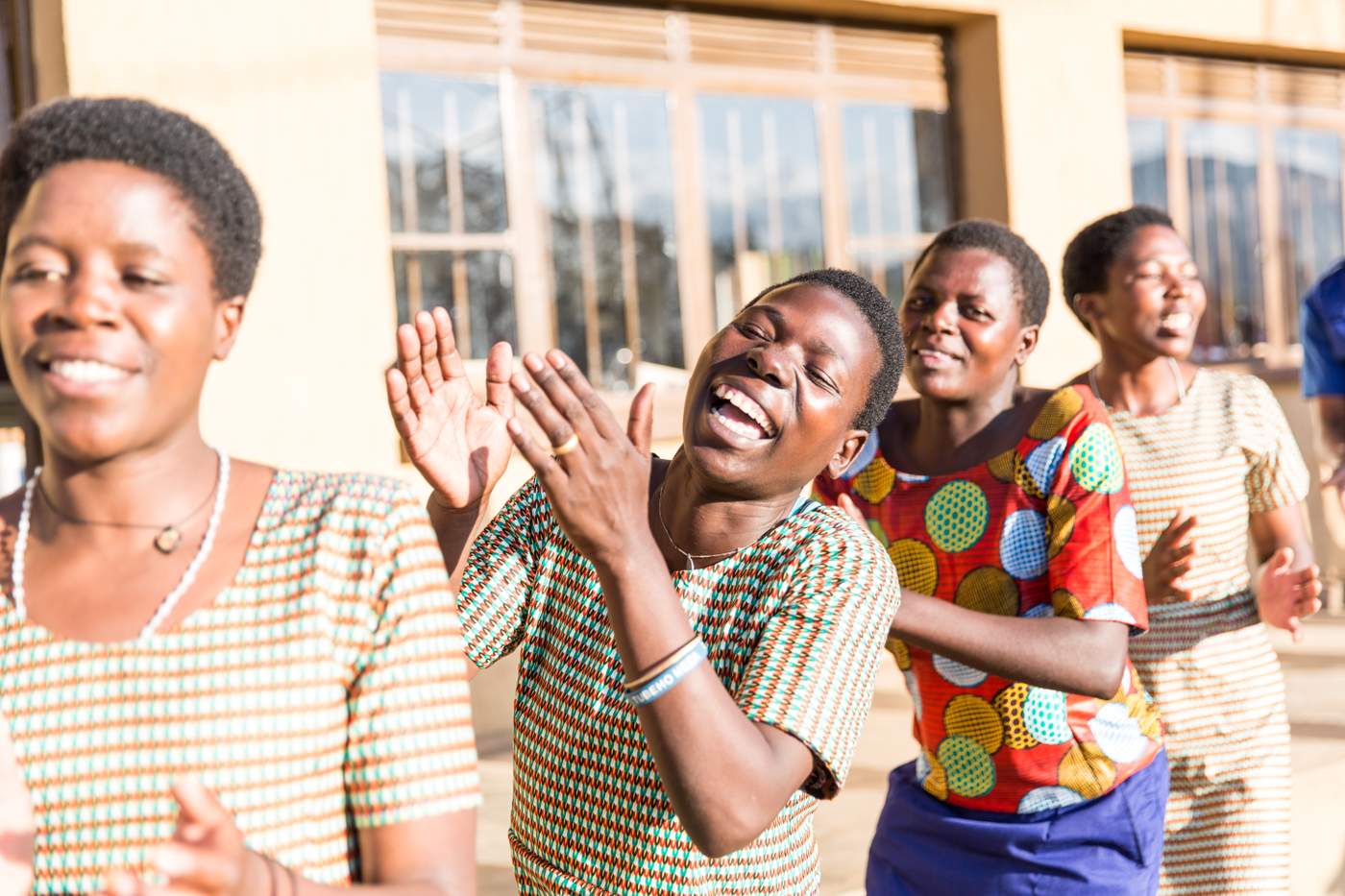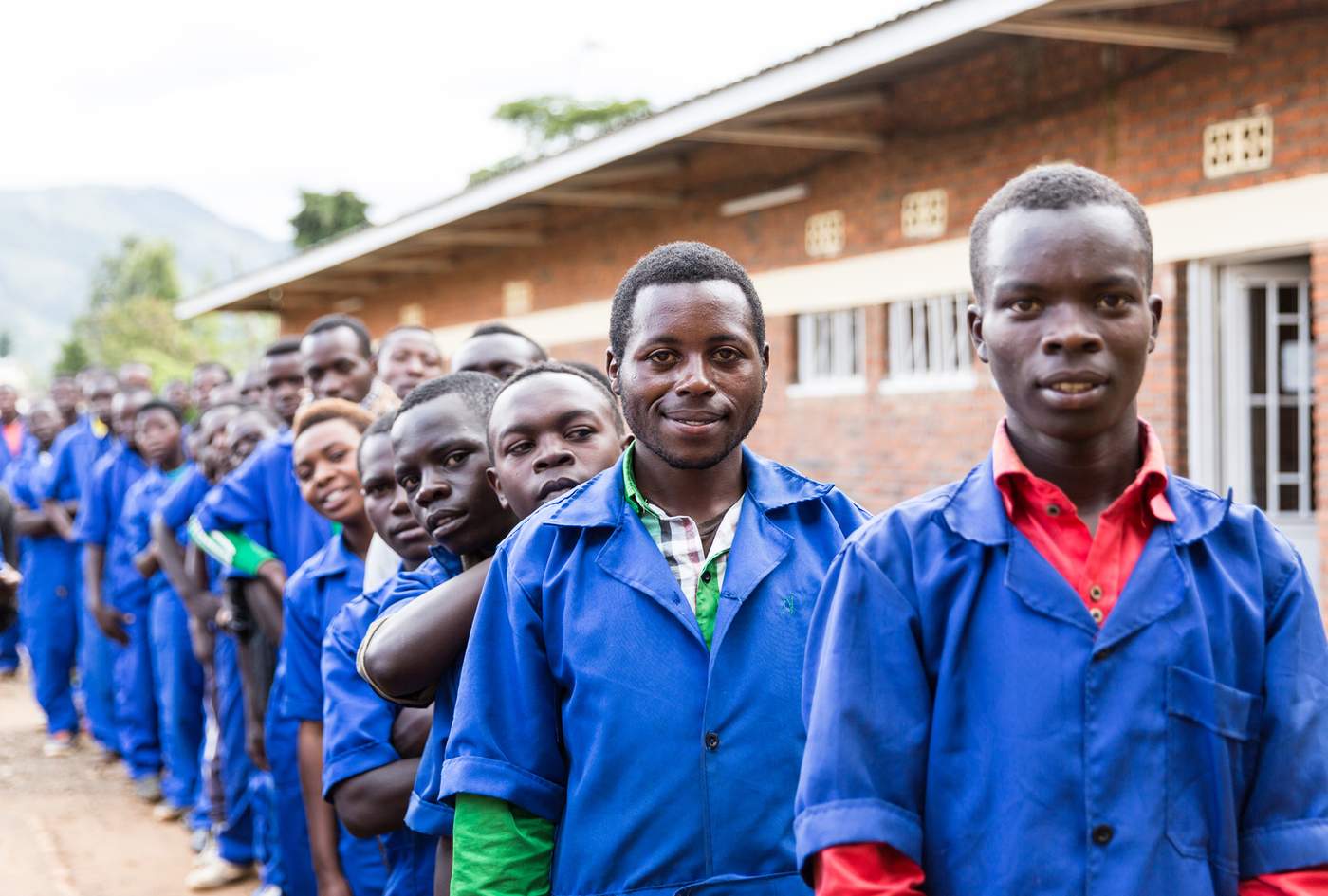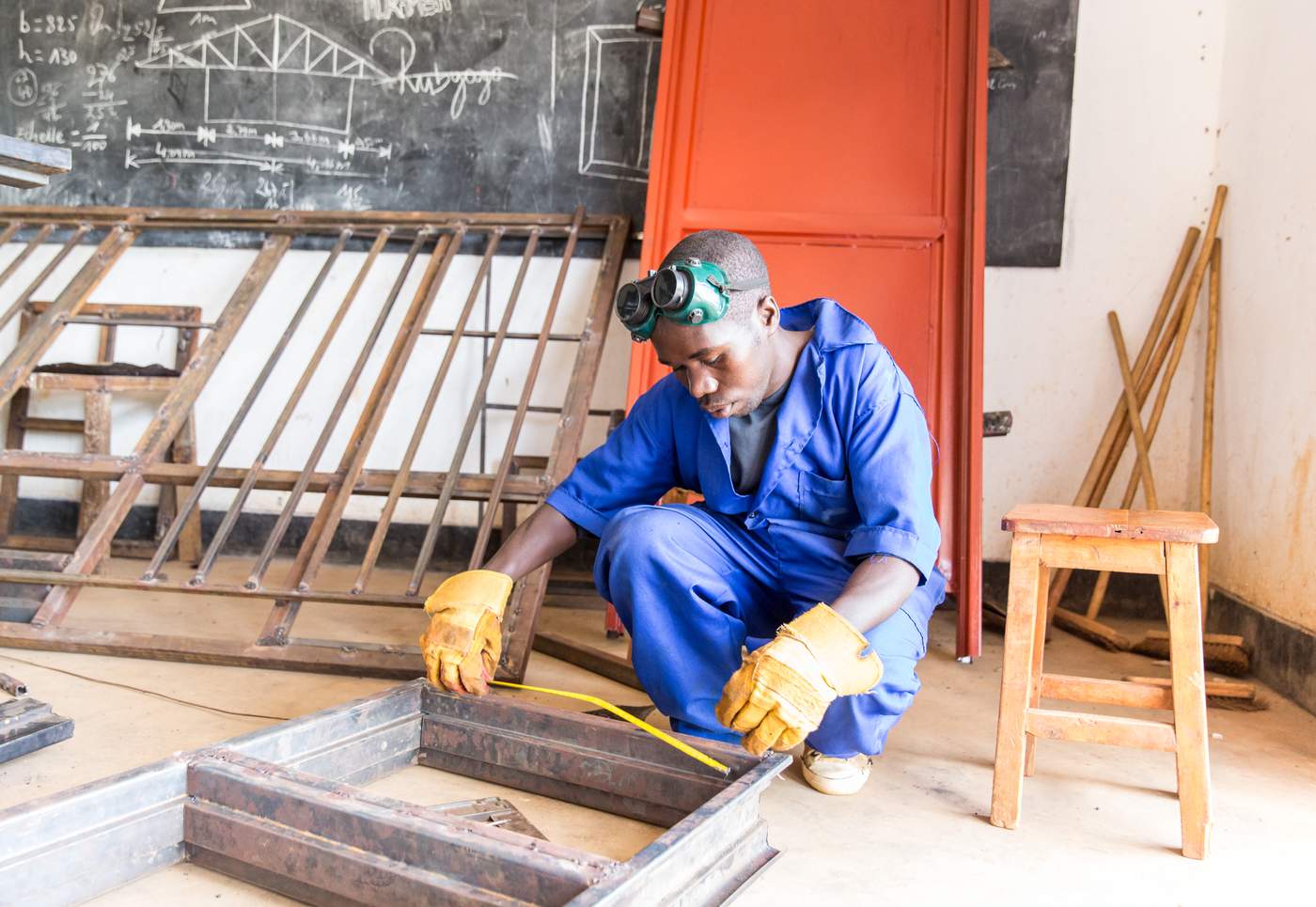BUILDING
A BRIGHTER FUTURE
THE REALITY OF CLIMATE CHANGE IN RWANDA
Natural hazards are a threat to this east African country: floods, landslides, droughts, windstorms, lightning, earthquakes, volcanic eruption and fires.

Young people in disaster-prone communities in the impoverished Ngororero District are learning technical market-oriented skills hoping to reduce their vulnerability to these disaster and climate related threats. Through a United Nations project, 220 people are taking part in training in ten different sectors.
“When I found out that I was going to participate in the tailoring training I informed my parents and neighbours. But they all discouraged me. They did not believe that I would make it."
Dorcas, who comes from a family of six, described how the landslides and floods complicated her life and that of her family’s.
“Before the disaster last year, some of my family members would wake up every day to go looking for agriculture jobs - something that I could not do, given my disability."
"After the disaster struck, nothing was left at home. So, everyone, including myself, was obliged to contribute to the family’s livelihood. It was a big challenge for me as I could not work in agriculture, which is pretty much the only option here for those who don’t have any technical skills.”
Dorcas is convinced that the training will help her find a job and contribute to her family’s welfare. According to Theogène, the training centre headmaster, Dorcas has good chances as she performs better than many of her classmates.
For Dorcas Ntawugirirabino, learning to tailor at the Hindiro vocational training centre, disability does not mean entrepreneurial inability.
“When I found out that I was going to participate in the tailoring training I informed my parents and neighbours. But they all discouraged me. They did not believe that I would make it."
Dorcas, who comes from a family of six, described how the landslides and floods complicated her life and that of her family’s.
“Before the disaster last year, some of my family members would wake up every day to go looking for agriculture jobs - something that I could not do, given my disability."
"After the disaster struck, nothing was left at home. So, everyone, including myself, was obliged to contribute to the family’s livelihood. It was a big challenge for me as I could not work in agriculture, which is pretty much the only option here for those who don’t have any technical skills.”
Dorcas is convinced that the training will help her find a job and contribute to her family’s welfare. According to Theogène, the training centre headmaster, Dorcas has good chances as she performs better than many of her classmates.
The Ngororero District, located in the Western Province, has a total population of 333,713. 48.9% of which live below the poverty line, while 29.5% live in extreme poverty. Due to the impact of climate change, this mountainous area is a high-risk zone for threats like floods and landslides.
“There was a heavy rain throughout the night. In the morning, there was water coming into the house. My wife went in to release the goats. I was outside digging a channel to let the water drain. It seemed that the mountain was coming down, in an eye blink everything was gone. I clutched to a tree and felt the mud passing through … it was so strong that took my boots away. Everything was gone. With the help of my neighbours we started digging to search my wife. We have found her only the next day, without life,” explains Gabriel Mukiera.
Gabriel Mukiera
Providing people with the right skills makes them less vulnerable to natural disasters. The United Nations (UN) (IOM, UNDP, UNICEF, UNHABITAT, and WHO) is implementing a joint programme to strengthen human security, enhance resilience and improve disaster risk management for the most vulnerable in the District, through an integrated, multi-sectorial and community-based approach using home-grown strategies.

Trainee Welders line up in Muramba
The project promotes access to off-farm livelihoods, skills development and livelihoods diversification to broaden income-generation options of vulnerable households. The UN Migration Agency (IOM) is supporting technical training in areas such as carpentry, masonry, mechanics, food processing, weaving, knitting, shoe making and catering.
"We like it because these are professions where you have the best chances to make decent profit."
“Before the disaster life was good. I lived with my family and we were happy. We used to play in the house and simply be together."
"That day I was left alone. I lost my mother, my father, my sister and my brother. They all died in the landslide. After the landslide, life turned hard for me. I was left with nothing, including any hope for the future.”

Jean Pierre during welding class
Learning to weld is one of the first steps to Jean Pierre rebuilding his life. This was a dream job for him but he had never had the means to pursuit it.
“Now I live in my wife’s parents’ house. If I am lucky and save enough money, I will buy my own house."
Jean Pierre and his wife have a baby called Elija. His wife works cultivating potatoes, maize, beans and sorghum.
"It is hard to raise kids, so I want to have only 3 and send them all to school. I do not want them to be raised in the same hardship that I was.”
Knowing he lives in an area that has no electricity, he is ready to travel around the region to find people that need his services. This way he will be able to start saving money.
Like Dorcas, many of the students have made plans for when they have completed training. Some plan to move to a different region, while others are organizing themselves and creating cooperatives. So, once they receive their machines, they can work together. There are three common goals among the students; to provide for their families, be productive and have a brighter future.
"We have to work hard so we can send our kids to school and give them the chance to have a brighter future. I want my boy to become a pilot. So then, he can navigate the sky and see other countries."
"I like it because I am capable of doing this job. I enjoy it so it is easy for me,” said 26-years-old Providence, who was affected by landslides in May 2016.
“It was a Sunday and we had gone to church to pray. Our goat and sheep died in the landslide. We lost everything but it is not the end of your life."
"The hardships you experience do not last forever. People should not lose hope. They should work hard to get through it. People should remain strong."

Providence is one of the 100 people affected by landslides being trained in welding, mechanics, masonry and tailoring at Muramba Vocational Training Centre. Providence is also one of the four out of the 38 mechanic trainees that are women.
"Once the training is finished I will practice what I have learned and encourage other girls to do the same."
"I have six male brothers. My family has been very supportive.”
This technical training project built on IOM Rwanda’s ongoing sustainable return and reintegration programmes. Over 77 vulnerable Rwandans returning from neighbouring countries, mostly the Democratic Republic of the Congo (DRC), were trained in hairdressing, welding, tailoring, carpentry and knitting.
Reintegration plays an essential role when migrants return home. It empowers and protects returnees by providing them with necessary tools and assistance to re-join their communities of origin. It helps them participate again in social, cultural, economic and political life at home.
These programme had three key aims. The first one was that returnees to be able to enjoy their human rights, ensuring they are fully protected and respected. Secondly, returnees should have increased access to basic social services, including basic education, primary health care and durable housing. Finally, returnees have increased economic opportunities.
The UN Joint Initiative, implemented in partnership with the Ministry of Disaster Management and Refugee Affairs, had a country wide geographic target.
Damacene
“I left Rwanda with my family when I was seven because of the war. My dad was killed during the Genocide against the Tutsi. I spent 12 years in the Democratic Republic of the Congo (DRC) living in tents in camps. My brothers found temporary jobs and could buy some food for us. It wasn’t a life– it was survival. To be raised by your brothers, who are almost the same age as you– it was hard.

I remember when my brother would take me to the Red Cross and they would give us biscuits. This is one of the only good memories I have from there. We would spend days without any food. One of my brothers died from diarrhoea.
When we decided to come back, we crossed to Rwanda and were received by the military. They gave us tea and food. I remember that I was so hungry and I ate so much that later I had a stomach ache. Back in Rwanda, I met Hitimana, an older mechanic in the neighbourhood. I was so fascinated by him and his job. Later I had the chance to study mechanics through IOM’s six-month training roughly five years ago. I received a toolbox to begin work immediately. Now, I run my own mechanic shop where I fixes motorbikes and sells engines and other parts but whenever I have any doubts I look for Hitimana advice. Now he is old and doesn’t work anymore, but he is full of knowledge.”
Today, Damacene has a wife and two kids. As a successful mechanic and business owner, he is able to take care of his family and community.
Photo of Damacene
It wasn’t a life – it was survival.
Olivier, now a 30-year-old welder, left Rwanda for DRC in 1994, when he was 10 years old, with his mother, father and two brothers. He remembers his father tiding him to his back with a rope with his brothers so that they would not get lost.
“We left on foot. We were always on the run - moving around. There were no houses and nothing to do. The hardest part was to find enough food to eat and a place to sleep."
"The leaders of the camp lived in tents, everyone else lived in the open. We were eating mostly cassava and bananas they would steal.”
The host communities were not always hospitable. Olivier and his brothers were not welcomed or liked because they would steal food. “Once I was caught stealing but as I was only a kid they slapped me few times and let me go. We were constantly on the run.”
Olivier was 16 when his parents and one of his brothers were killed there in conflict.
He returned to Rwanda with the support of the Red Cross in 2009, when the situation in DRC was no longer bearable. Later, IOM supported him through training and the provision of a business start-up kit.
“I was really pleased with all the support I received upon my return. After the training, I rented this place and some equipment with 3 friends from the same training with the start-up cash that was given to us”.
They are still working together with the vision of creating a cooperative.
Before the training he would do some small jobs that would enabled him to live day to day. Today he has a house and he has already extended it, he wishes to keep improving it to live with his family in a pretty house. He has a wife and 2 children of 7 and 4 years old.
He wishes to develop himself and to contribute with the development of the community.